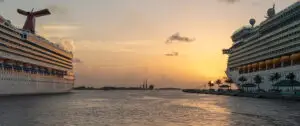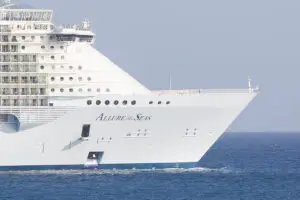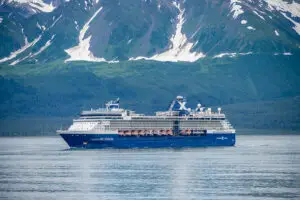
FDA Warns American Cruise Lines of Legionnaires’ Cases Onboard
FDA Warns American Cruise Lines of Legionnaires’ Cases Onboard By Delgado Trial Attorneys The Food and Drug Administration (FDA) has issued a warning after multiple
Working on a cruise ship can be an exciting experience, but it can also expose you to a high risk of injury. Depending on the type of work a crew member performs, the long hours, repetitive lifting, and demanding tasks can lead to injuries. As a crew member working for a major cruise line, an experienced cruise ship crewmember accident lawyer will tell you about your right to receive compensation for any injuries you have sustained while on the job. It is important you have someone experienced in fighting for the rights of injured seafarers on your side to help navigate the complexities of maritime employment laws.
The Maritime Labour Convention of 2006 is the multinational agreement of seafaring nations that defines the rights of seafarers and the obligations of their employers and the seagoing vessels they serve.
Just like any other employer, cruise lines owe a duty of care to keep their crew members safe and free from harm. This duty includes ensuring that they are maintaining a reasonably safe work environment for all crew members. Cruise lines must also practice safe hiring and training procedures to ensure the safety of their crew. If you are injured while working on a cruise ship, and this injury is the result of the cruise line’s negligence, you are entitled to compensation for your injuries.
When a crew member falls ill or is injured while working on a ship, the owner or operator of the vessel is responsible for paying for what is known as “maintenance and cure.” This obligation is considered to be a “no-fault” system that provides medical care regardless of who is at fault for causing the injury as long as it was not an intentional act.
Like workers’ compensation, maintenance and cure involves payments that are meant to cover a portion of your living expenses while you are sick, as well as the cost of your medical bills and/or treatment to get you to the point of maximum medical improvement (MMI) and unearned wages that you would have earned had you not become sick or injured.
The right for crew members to seek maintenance and cure payments is a legal principle that is well-established in the cruise industry. For the most part, receiving these claims should be relatively straightforward, but if a shipowner is found to be deliberately withholding these payments, they could also be forced to pay attorney’s fees and punitive damages.
When a seafarer is injured because of his employer’s negligence, the general maritime law provides a remedy to recover compensation through the Merchant Marine Act of 1920, commonly known as the Jones Act. This federal legislation gives crew members who are injured while in the service of a maritime vessel the right to sue for negligence and damages sustained as a result.
Under the Jones Act, cruise lines and shipping entities must provide their crew members with a reasonably safe place to work, and they must use reasonable care to maintain and keep the vessel a reasonably safe place to work.
The requirements of the Jones Act are fairly strict for the maritime employer. Essentially any unsafe condition can lead to Jones Act liability, including the following types of unsafe conditions:
The Jones Act has a relaxed standard for proving causation than a general claim for negligence in a land based case. In a standard negligence case, you need to prove that the defendant’s negligence was the actual and proximate cause of your injury before you are entitled to compensation. However, in a Jones Act case, the standard for proving causation is known as “featherweight” because any negligence on the part of the employer that caused the injury, in whole or in part, will be sufficient.
The lower burden of proof makes it easier to prove the negligence of the maritime employer and the seafarer’s right to be compensated. Stated differently, injured seafarers still need to prove their employer’s negligence played at least some part in causing the seafarer to suffer injuries.
Cruise lines and maritime vessel operators must also provide a seaworthy vessel for their crew members. According to the general maritime law, a vessel is seaworthy if its hull, equipment, and crew are reasonably adequate in their maintenance, design, and character to perform the intended functions in the operation of the vessel.
To say a ship is not seaworthy does not require the injured party to show the entire ship is seaworthy. You only have to show that some condition or one function of the ship, the equipment, or crew was not reasonably fit for its intended purpose and that you were injured as a result of this failure.
This cause of action enables an injured seafarer to pursue a claim for their injuries against the vessel itself, or the vessel’s operator. Under certain circumstances, a vessel can be seized by the Federal authorities in a procedure called a ship arrest and held in port until sufficient collateral is deposited with the arresting court’s registry. The funds are held by the courts until the matters are resolved and prevents unscrupulous ship owners from raising the anchor and fleeing the jurisdictional reaches of the authorities to the detriment of an injured seafarer.
If you are a seafarer that has been injured while in service of a cruise ship, the most important thing to focus on is your medical recovery. Getting the medical care you are entitled to is not always as easy as it should be. That is why, it is equally important that you talk to an experienced cruise ship crewmember accident lawyer to learn about your legal options. They will help you determine if you have a case against the ship or your employer and they will help you successfully recover compensation for your injuries.
The Miami-based cruise ship crewmember accident law firm of Delgado Trial Attorneys are equipped with a skill set that few other maritime attorneys can claim. Specifically, their diverse professional experience including Raul G. Delgado II’s extensive experience defending insurance companies and the major cruise lines and preparing their trial strategies for years before beginning to represent passengers and crew members injured because of the cruise lines’ negligence. Coupled with Raul G. Delgado’s 44 years of personal injury experience fighting on behalf of injured accident victims throughout Florida, Delgado Trial Attorneys offers a combination of experience in all types of cruise ship personal injuries unlike any of their competitors.
This experience allows us to effectively strategize and advocate for every client we represent. We have handled all types of cruise ship crewmember and passenger accidents over the years with a focus on slip, trip and falls, Jones Act negligence, onboard medical malpractice, FlowRider accidents, sexual assaults, Death on the High Seas, and more. Contact our law firm today for a free case evaluation. Virtual sign-ups available.

FDA Warns American Cruise Lines of Legionnaires’ Cases Onboard By Delgado Trial Attorneys The Food and Drug Administration (FDA) has issued a warning after multiple

Should You Purchase Travel Insurance for Your Upcoming Cruise? By Delgado Trial Attorneys The purpose of travel insurance is to cover the nonrefundable costs associated

Medics Take an Hour to Reach Injured Royal Caribbean Cruise Passenger Who Died While Waiting to Receive Care By Delgado Trial Attorneys Tragedy struck in

U.S. Court of Appeals for the Eleventh Circuit Rules in Favor of Celebrity Cruises Crew Members By Delgado Trial Attorneys MIAMI – (November 30, 2022)